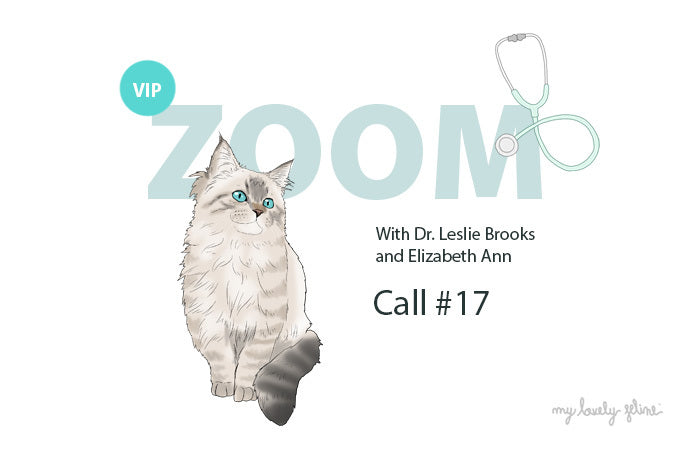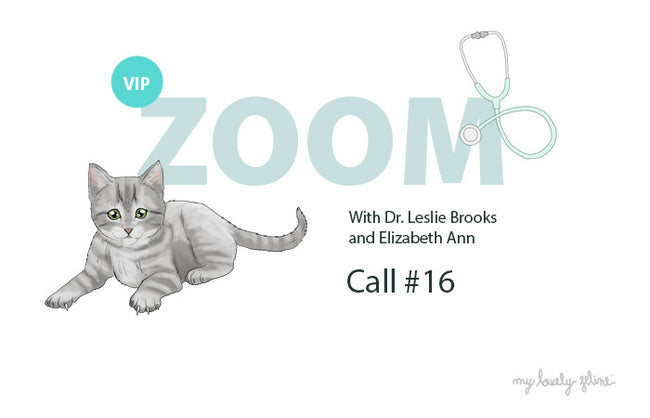|
Gluten-free food has been a hot topic in the pet world lately. In this Zoom call, Indiana small animal veterinarian Dr. Leslie Brooks talks about the controversy surrounding it and also reviews inflammatory bowel disease (IBD), which is one of the more common chronic diseases found in cats. Fostering and behavioral specialist Liz Italia co-hosted the call. Note: We host these interactive calls exclusively with some of our customers—once every two weeks 🙌 |
Recorded: October 12th, 2020.
|
Disclaimer: The opinions expressed in this call are those of the guest(s) and/or host(s) and may or may not reflect the views or opinions of My Lovely Feline. |
Gluten-Free Food & Heart Disease Concerns
As more people are diagnosed with celiac disease or gluten sensitivity issues, the need for gluten-free human food has been increasing over the years.
There has been a slight crossover into pet food. In Leslie’s opinion, when the gluten-free market hit the pet industry, it was all about anthropomorphizing pets to make it feel like if people shouldn’t eat gluten, pets shouldn’t either. It turned into a trendy thing, with some companies saying gluten-free food was healthier than the alternative.
The truth is there’s no evidence that cats have a gluten allergy or that they need to eat gluten-free food. When an animal does have a food allergy, it’s more often associated with the protein in the food, like the chicken, pork, or beef, over the grain (like corn or rice). On occasion, a cat might have a specific grain allergy, but that doesn’t mean they have to avoid all grains.
Recently, there has been evidence that some of these gluten-free foods cause heart failure. The condition appearing was dilated cardiomyopathy, which is when the heart wall gets really thin, the heart enlarges, and the muscle in the heart wall gets so thin that it can’t pump blood as it should. Although more in dogs, it’s been seen in a few cats too.
In some cases, the vet or cardiologist switched them from gluten-free food back to regular food, and the animal got better. Heart murmurs disappeared, and the heart started functioning more normally. Some pets to go on heart medicine, and others had their diets supplemented with an amino acid, taurine.
The FDA is investigating this issue, and they’re trying to determine what about these gluten-free foods is causing this in pets. It’s not every brand, but it happens more with boutique pet foods (not the big name brands).
It’s possible the heart failure isn’t from a lack of gluten, but that the gluten is replaced with other vegetables like lentils and peas, which could affect how animals absorb taurine from the food and metabolize it in their body.
The bottom line is that we don’t know why it’s happening, but the recommendation is to transition dogs and cats off gluten-free food and go back to regular food.
Inflammatory Bowel Disease (IBD)
A lot of cats suffer from inflammatory bowel disease (IBD), but it’s not because of gluten (unless extensive testing is done to prove a cat is allergic to it, which is extremely rare). In this condition, the immune system in the gut is overactive, causing an overwhelming amount of inflammation, anywhere from the stomach to all three sections of the small intestine. This causes the intestines to move too much or too little. Symptoms include:
- Diarrhea
- Constipation
- Nausea
- Vomiting
- Weight loss
- Appetite loss
In some cats, their blood work is normal, and they are eating fine but still losing weight.
Diagnosis
Usually, a cat needs to have an abdominal ultrasound so the radiologist can look at the layering of the intestines. If they’re really thick or filled with fluid, that’s a good indication it could be IBD.
It’s important to note that there is a type of lymphoma that can affect the intestines and cause similar imaging findings.
To get a definitive answer, the vet will need to do biopsies with a needle or even full surgery to collect biopsy samples. Sometimes a malabsorption test along with other diagnostics can provide answers.
Treatments for IBD in Cats
#1 Steroids - One of the most common treatments for cats with IBD is to use steroids, most commonly prednisolone, which will decrease inflammation. Keep in mind one of the side effects of prednisolone is increased thirst and urination.
Steroids also suppress the immune system, so cats with heart disease or really bad kidney disease might need to be on aa really low dose of steroids, or even something like budesonide, which is a steroid that isn’t systemically absorbed. It only works in the small intestine to reduce inflammation, so there’s less of a risk of side effects.
#2. Probiotics - There are many different types available (like Proviable or FortiFlora), but Liz recommended the strain s. Boulardii.
#3 Antibiotics - Some vets prescribe cats a long-term course of an antibiotic called metronidazole.
#4 Diet - There is a prescription diet called hydrolyzed protein, where the protein is broken down so much into tiny particles that the cat is getting the nutrition but their overactive immune system doesn’t recognize it or overreact to it.
If a vet knows what’s making the cat react, they may put them on a different select protein diet like rabbit and potato.
Prescription diets are a bit more expensive, especially because they’re made in specific isolated ways to be mixed with other foods during processing and packaging. These diets require a prescription from a vet.
If you buy a prescription diet for your cat and they don’t eat it, you should be able to return it to the store for a refund.
#5 Fecal Transplantation - Liz shared that she did fecal transplantation, a newer science, for her two cats with IBD, and it significantly helped the condition of their stool.
She worked with a company (AnimalBiome) that collects stool from cats with balanced gut bacteria, analyzes it to make sure there are no parasites and contagions, dehydrates the stool, and puts it in capsules. These are in turn ingested by a cat suffering from IBD.
Supplementing the gut with the correct bacteria helps the cat with IBD get a more balanced microbiome (gut bacteria).
The steps include sending in a stool sample, getting it analyzed, giving the cat capsules for a period of time, and then retesting the stool. She treated two cats, and they both improved.
Q&A
Q: Is gluten-free the same as grain-free?
Leslie: They are not the same, but grain-free is gluten-free.
Liz: My understanding is gluten-free is a specific type of grain, but grain-free is free of all grains.
Q: Is there any indication that the high protein food is connected to kidney disease?
Leslie: I have not heard that, and I’m really not sure.
Q: How can I get my cat with kidney disease to drink more water? I have a My Lovely Feline fountain.
Liz: Sometimes, I get the cat packets that are mostly broth, and I put it on top of the wet food, just to add even more moisture.
Q: Do you have a brand you tend to like or recommend more?
Leslie: It depends on the condition. I’ve prescribed Purina, Hill’s, and Royal Canin. A lot of it depends on the clinic and which company they partner with. They all pretty much make the same prescription food.
Q: Do you know if some urinary diets only prevent the crystals from forming, whereas another diet may dissolve the crystals? I read somewhere that they don’t all dissolve the crystals.
Leslie: I’m not sure, but I think that is correct. You’d have to check the specific food’s website for details.
Conclusion
When it comes to specific diets and digestive issues, it’s important that you discuss all of your options with your vet. Whatever course of action you decide to take, make sure you’ve reviewed the pros and cons, and accept any associated risk (no matter how small).
It’s a delicate balance between juggling a financial aspect, ongoing research, as well as your cat’s wellbeing. Make sure you pay attention to how your cat handles any diet or treatment plan and reach out to your vet with any concerns. There are many diets and many different options to treat IBD, so you can always change from your original plan if what you’re trying isn’t working.
Call #17 Hosts:
Dr. Leslie Brooks 👩⚕️
Veterinarian
Elizabeth Italia 🙋♀️
Cat Behavior & Fostering Specialist




